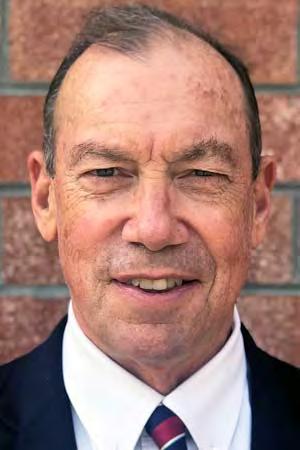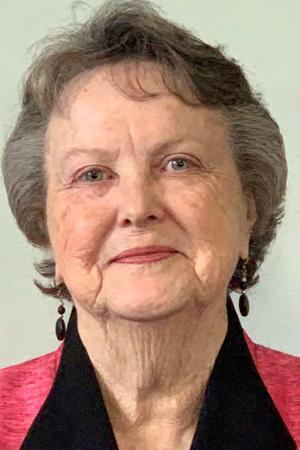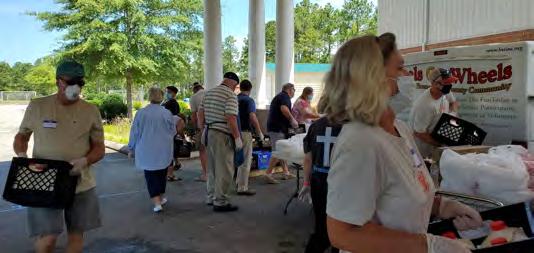
12 minute read
BSRI Board of Directors
Guidance and Expertise: Meet the BSRI Board
MARY ANN DUGAN Board Member
Mary Ann DuGan has served on the board of directors since early 2019, soon after she and her husband, Chuck, moved to Calabash from Pennsylvania. Serving as a BSRI board member has allowed her to continue to serve older adults. She’s learning more about the needs of and services for seniors living at home in Brunswick County. She also volunteers and serves as secretary for Brunswick County’s Nursing Home & Adult Care Home Community Advisory Committee. DuGan retired after more than 30 years of leadership experience in senior independent living and personal care communities. She has volunteered with senior support organizations including the Bucks County, Pa., Long-term Care Consortium, and PACE, a prescription assistance program for older adults. DuGan has a bachelor’s degree in gerontology from the University of Scranton and a master’s degree in aging services from the University of Massachusetts.
Fun Facts
What book are you reading now? Mary Beth Keane.
“Ask Again, Yes” by
Where did you grow up? Richboro, Pa. What was your first job? A waitress in a long-term care facility. What is something people don’t know about you? fraternal twin with six older siblings. I have three children and seven grandchildren. I’m a
—Holly Tate JOHN INGRAHAM Board Member and Former Chairman of the Board
John Ingraham joined BSRI’s board of directors in 2006 and is now its longeststanding member. He credits his parents with inspiring him to serve: They allowed him to see how income affects the nutritional needs of older adults in Brunswick County. He developed a passion for creating ways to meet these needs, adding centers where congregate meals could be served, meals delivered to seniors’ homes, and more.

Today Ingraham serves as chair of BSRI’s business development committee, which works to generate income that’s used to provide meals and other services for Brunswick County seniors. Ingraham’s career also reflects his passion for helping older adults. His business, John Ingraham LLC, offers financial education and planning for seniors and retirees. He is a graduate of Curry College with a degree in finance and communications.
Fun Facts
What was your first car?
A ’57 Chevy for $200. What keeps you up at night? in need? How will we feed people
Where did you grow up? Hingham, Mass. What was your first job? Golf course caddy. What motivates you? Helping people.
Kindle or book? Book.
Favorite cookie? Oreo.

Myong Jensen brings a distinguished record of top-notch professional experience and education to the board of BSRI. She has a master’s degree in systems management and bachelor’s degrees in computer science and business.

Jensen held numerous senior executive positions in information technology for Fortune 500 companies including Grumman Aerospace Corporation, NCR Corporation and SAIC. In 2005, she formed Information Technology Solutions and Consulting LLC, an award-winning womanowned small business providing consulting and analytical services for multiple industries. In 2017, Jensen sold her company and relocated from Virginia to Ocean Isle Beach.
“I was taught early on to be compassionate and to respect elders. That philosophy was paramount in my decision to join the board,” Jensen says. “I feel extremely fortunate to have found an organization that is dedicated to promoting the well-being and enhancing the quality of life for all senior adults in Brunswick County.”
What motivates you? Hearing about history from those who lived during those times is especially interesting. Jensen is motivated by intellectually stimulating conversations and learning. What are you reading? I am currently reading “The Last Lion” by William Manchester and Paul Reid in preparation for a trip to England. First car? My first car was a deep green V8 Chevy Malibu, purchased in 1974. I could take off in no time and run fast. I have a good memory of the car. I still love it.
— Beth Klahre
Ella Jane Marston has been on the board of BSRI for one year. Marston says, “I love helping people, especially those who are not able to help themselves or who have no family.”

She is a genuine local, living today on the exact property in Bolivia where she was raised. She has fond memories of her childhood.
“I didn’t realize how fortunate we were. Even in our rural town, there were always friends around. We played basketball together, went trick or treating and hung out eating watermelon. We just had good times together.”
Marston earned her degree at University of North Carolina Wilmington followed by a 38-year career as an accounting manager at Archer-DanielsMidland Company, previously owned by Pfizer.
Today she is the mayor of the town of Bolivia.
What are you reading? “Someone Like You” by Karen Kingsbury. I really enjoy all of her books because she reminds us that God has a plan for each one of us. Plain or pepperoni? Meat lover’s pizza. Favorite cookie? Pecan shortbread.
Morning person or night person? I’m a day person, if I sleep late, I feel like I have lost half of my day.
—Beth Klahre
Guidance and Expertise: Meet the BSRI Board
CLIVE MEERHOLZ Board Member
Clive Meerholz joined the BSRI board of directors in 2019. He is retired from the biochemical industry, and also volunteers with Meals on Wheels. He became a board member as a way to provide a necessary link between the board and the Meals on Wheels program. Meerholz went to the University of Witwatersrand in South Africa and then on to the Imperial College in London, England for a PhD in organic chemistry. He worked in the pharmaceutical industry, first in England, and beginning in 1995, in Chapel Hill, where he moved with with his wife and two boys. He retired in 2013 after 43 years in the industry and moved to Brunswick Forest in Leland in 2015.
Fun Facts
Where did you grow up? I grew up in the small town of
KELLI LOVETT Board Member
Kelli Lovett joined the BSRI board on June 26. She is the co-owner and manager of Coral Tree Salon and Day Spa in Ocean Isle Beach. She previously worked in sales and marketing, and is a licensed real estate agent in South and North Carolina. Lovett has a B.A. from Peace College and a master’s in public administration from Walden University. While looking for volunteer opportunities, Lovett saw an email from the Chamber of Commerce announcing that BSRI was looking for volunteers. “I started helping [Volunteer Coordinator] Sarah Powell with some administrative work, and she thought the board might be a good fit for me,” Lovette says.
Fun Facts
What book are you reading now? A biography about Ghengis Khan and his impact on the modern world. Cat or dog? Dogs! I have a 9-year-old lab mix named Lily. I’m also allergic to cats so it’s an easy decision. Benoni, just east of Johannesburg in South Africa, and have been a citizen of three countries: South Africa, the United Kingdom, and now, the United States.
Favorite season? After all these years in the United States, I still find the summers hot and humid. So my favorite season is spring, which I enjoy with a nice hot cup of tea and a piece of fruitcake.

—Joan Leotta
DAN BRUNEAU Board Member
Dan Bruneau is a newbie and was just appointed to the board on June 26. He previously volunteered with BSRI helping to develop the new websites for the thrift stores.
Bruneau recently started a consulting business in communications and professional development. He retired in 2018 after 24 years working in communications for the U.S. Department of Veterans Affairs. He also worked in public affairs at RDU Airport and as a reporter and editor for newspapers in Wisconsin and North Carolina. He earned a B.A. at the University of WisconsinEau Claire and a J.D. at the University of Wisconsin Law School.
Fun facts
What is something people don’t know about you? I’m an owner of the Green Bay Packers, holding all of one share of stock in the team.
By Pat Naughton
There are several advantages to growing plants in containers:
Containers can be placed a level that allow easy access for those with physical limitations.
The environment of the plant can be changed by moving the plant from sun to shade.
For homeowners who do not have a large yard, container plants offer a great alternative to in-ground gardening.
Start by selecting the appropriate type of container for the plant. For drought-tolerant plants, select a porous or semi-porous container. Clay and unglazed ceramic pots are porous. Wood containers are semi-porous. These types of containers lose moisture more frequently and are appropriate for succulents and cacti.
Plastic, metal, and fiberglass pots are nonporous. Pots of these materials hold water well and are lightweight and can be easily moved.
All pots should have drain holes near the bottom. If the container is sitting on a solid surface, like a patio, then make drainage holes on the side. Choosing a larger container will benefit root growth and the soil will not dry out as fast.
Use a potting mix instead of soil from the yard. Soil from the yard often retains too much water, has little pore space (for oxygen), and may contain harmful diseases and weeds.
There are many high-quality commercial potting mixes available. Some mixes contain a small amount of fertilizer which will get the plant off to a good start. The fertilizer will be short-lived and routine fertilizing will be needed. Media from old pots can be reused if the previous plant did not show any signs of disease.
Liquid fertilizers are desirable after the plants are growing. This water-soluble fertilizer is a quick way to replace lost nutrients. Salt accumulation at the bottom of the pot may occur after prolong use of liquid fertilizers. If this observed, flush the soil by running water through it for several minutes.


Container gardening allows you to adjust the environment of your plants, easily moving them from sun to shade if needed. This porch garden features flowers, but vegetables also grow well in containers.

materials to reduce their immediate solubility. This type of fertilizer makes nutrients available for several months. It can be mixed in the media or sprinkled on top, called top dressing. Top dressing typically results in less nutrient loss since the nutrients must travel through the soil which increases the chances that it will be adsorbed by the plant.
Slow-release fertilizers are designed to release a bit of fertilizer over an extended period. You only need to apply them once or twice a season. This type of fertilizer may be too slow to release nutrients for fast-growing plants. One downside to this type of fertilizer is not being able to tell when it’s used up. You must watch for the plant to show distress and that it needs to be fed.
Place plants together in the same container that have similar environmental needs, such as light and water. This information can be found on the plant label or at the N.C. Extension Gardener Toolbox, https:// plants.ces.ncsu.edu/. Container plants will dry out faster than in-ground plants. On sunny days plants may require water twice a day.
More information on container plants can be found in the N.C. Extension Gardener Handbook which is available at NC Extension Gardener Container Gardening and NC Extension Edibles Container Gardening.

By Donna Ruth Morgan
Some of us like to have a variety of books around to dip into as the mood strikes. Sometimes you want to learn more about the world—and then again, sometimes you really don’t. Our August book reviews offer suggestions for both types of reading.
For those who want to live happily as long as possible,
Successful
Aging (2020) has the latest research on getting older and protecting our brains. Neuroscientist Daniel J. Levitin notes that “Eighty really is the new 60” and “This is the best time in history to be alive and aging.” Learn how cognitive abilities like pattern recognition, crystallized intelligence, and accumulated knowledge are at top strength in older adults— and the peak age of happiness “tends to be about 82.” Nutshell review: Dr. Levitin’s conversational writing style lightens his scientific presentation.
Redhead by the Side of the
Road (2020) is a wonderful distraction to self-quarantine. Anne Tyler’s oeuvre reveals a talented novelist whose books present a dilemma: read straight through or savor over time. This was a nonstop, page-turning delight on a gray day. Believable characters, excellent exposition, and themes of isolation, loneliness, and fear fed right into present-time vibes. Nutshell review: Too-slender (novella length) story of everyday people and less-thaneveryday events, with messages of hope and joy.
Midnight in Chernobyl: The Untold Story of the World’s Greatest Nuclear Disaster byAdam Higginbotham(2019)pulls open the USSR’s Iron Curtain in a long, technical narrative based on 10 years of research. The unfolding events read like a mystery novel: The chronology is straightforward, and the maps, schematics and epilogue provide guidance and closure. Nutshell review: Dense exposé of tragic, deadly events created by an inept, obfuscating bureaucracy.
Diane Chamberlain’s Big Lies in a Small Town (2020) has alternating timelines of two white artists linked by a black artist. The action is slow and the plot is cliché at best. Topics of racism, sexism, and abuse are not well-served by the flighty, predictable female protagonists’ actions and reactions. Nutshell review: The reviews promised more than the book delivered.

If you can imagine statusobsessed suburban moms hunting the undead, The Southern Book Club's Guide to Slaying Vampires (2020) is right up your alley. True to the Southern Gothic genre, author Grady Hendrix hits every note— irony, dark humor, and flawed humans who slowly work up gumption to handle a spooky problem. Nutshell review: Snarky satirical horror makes a good (chilling!) summer read.
At press time, Brunswick County libraries remain closed, but all five branches offer curbside pickup. Use the online catalog or call to put books, magazines, movies, audiobooks, and music CDs on hold.
The library will contact you once they are available. When you arrive to pick up, call and they will be brought outside with no direct contact necessary. Place returns in the book drop or hold on to them until reopening—no fines will be charged.










